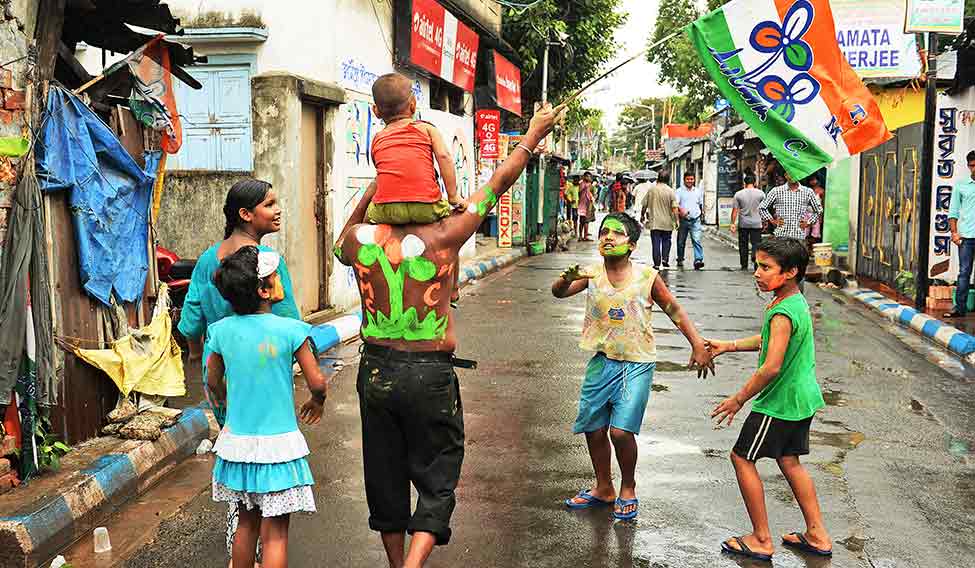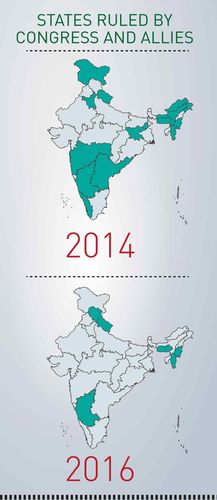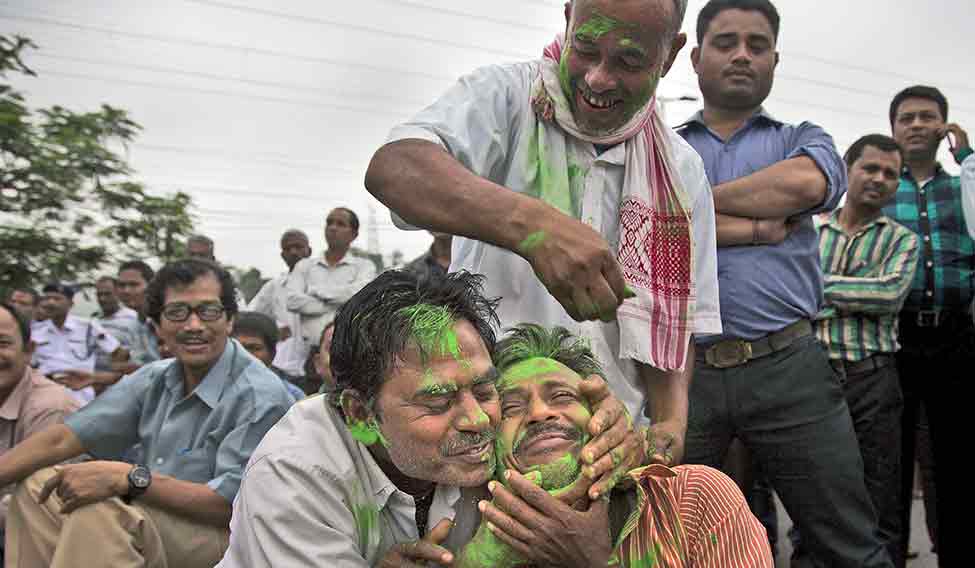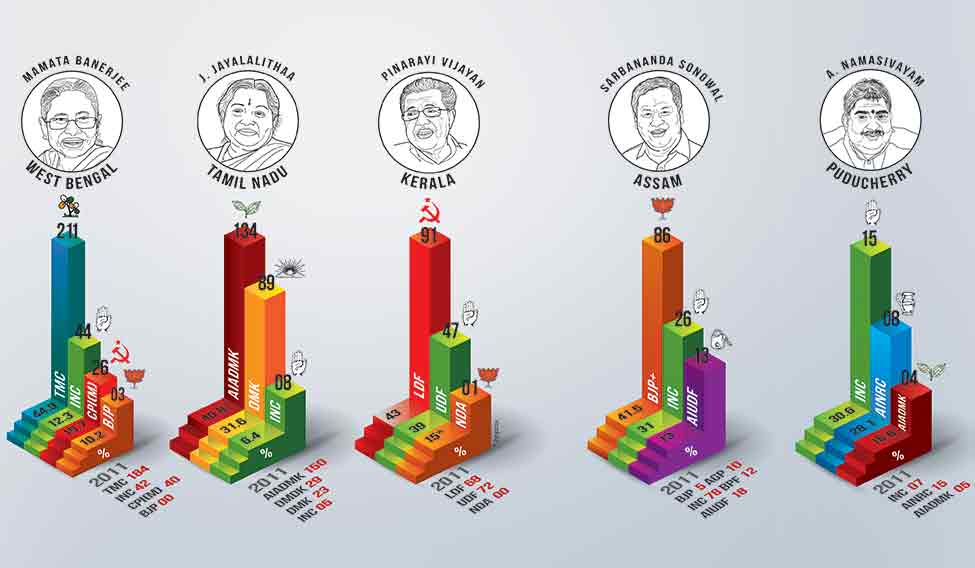To BJP president Amit Shah, it was not a fight for just five provincial legislatures. Nor was it a fight to win a few of the 824 assembly seats—of which the BJP held only five. For him, it was a fight to take the saffron flag to every corner of India—from “Kerala to Kashmir; from Kutch to Kamrup,” as he put it on his V-day.
Coupled with it was his goal of achieving a Congress-free India. He has won only one state from the Congress this time, and the grand old party is still ruling Karnataka and the smaller states of Himachal Pradesh, Uttarakhand, Manipur, Mizoram and Meghalaya. Only weeks ago had Shah attempted a shortcut towards achieving his goal through a political coup in Uttarakhand, and faced a constitutional setback.
Now, the spectacular defeat of the 15-year-old Congress regime in Assam and the successful break-in battle into the formidable fortresses of Kerala and West Bengal have given him and his party a new confidence to achieve both goals—of flying the saffron flag in every corner and achieving a Congress-free India.
In the process, his party has also broken a few jinxes; one of perception, and the other about certain no-go territories.
The first jinx, of perception, was that the Narendra Modi regime had peaked within its first year itself and was on the way down. In the first year, the BJP had a victory run in Maharashtra and Haryana, and even formed a partnership government in Muslim-majority Jammu & Kashmir, but the party's growth seemed to have got frozen by the winter of 2014-15. In 2015, it suffered a humiliating defeat at the hands of the upstart Aam Aadmi Party in Delhi and then got blocked by a formidable phalanx of parties in Bihar led by Nitish Kumar of Janata Dal (United).
The two reverses had also dampened the party's spirits. Though most partymen did not think that the Modi regime was on the way down, they felt that its growth had peaked. And the opposition parties had been finding common cause to oppose the Modi regime over legislative bills in Parliament, communal questions on the streets and ideological issues on campuses. Thus, faced with an energised opposition, the BJP had been fighting what had looked increasingly like a defensive battle of political issues.
 In full bloom: Trinamool Congress supporters celebrating in Kolkata | Salil Bera
In full bloom: Trinamool Congress supporters celebrating in Kolkata | Salil Bera
The jinx of perception has now been broken. There is now a confidence that the party is back on the victory track, and should do well in the assembly elections in Uttar Pradesh, Punjab, Gujarat and Uttarakhand next year.
The other jinx was over certain no-go political territories. No BJP legislator had ever sat on the treasury or opposition benches of the highly literate and politically proud state of Kerala. And, no BJP ticket-holder had ever won in a general election to the West Bengal assembly. A couple of partymen had 'wriggled in' through byelections. That jinx, too, has also been broken. Now, as Union Minister Prakash Javadekar put it, "We are emerging as the third political alternative in Kerala.”

If it was sheer aggression that helped the party break the jinx in Kerala, it was superior political savvy in making alliances that helped the BJP in Assam. Unlike in Tamil Nadu or West Bengal, the fight in Assam and Kerala was against two parties, the Congress and the CPI(M), that harboured a visceral hatred for the BJP. To that extent the victory in Assam and the break-in into Kerala taste sweeter for the BJP than its fairly commendable performance in West Bengal. “Now we have moved two steps closer to Congress-mukt Bharat,” said Shah. Agreed Union Minister J.P. Nadda: “The results show very clearly that India is moving towards Congress-mukt Bharat.”
Congress leaders feel that Shah and company are reading too much into their own performance. “That is misreading of the situation,” said Congress leader and former minister Jairam Ramesh. "We lost Assam after being in power for 15 years there. In Kerala, there is a tendency of change in government every five years. India cannot become Congress mukt." But then, Congressmen also realise that while they could not buck the trend of yo-yo politics in Kerala, in neighbouring Tamil Nadu, J. Jayalalithaa has done exactly that.
Though putting up a brave face in public, Congress leaders privately admit that they have been the worst performers in this round. While the BJP has been the clear winner among the national parties, the communists have the satisfaction of having performed brilliantly at least in Kerala where they are going to form the government. And this realisation has now put a question mark over the plan to elevate Rahul Gandhi as president of the Congress this year.
The Congress had gone to the polls making it look like a fight led by Rahul Gandhi. He took most of the strategy decisions and campaigned more actively than Sonia Gandhi. (Rahul addressed 28 rallies; Sonia 11.) With the party's performance being dismal in all the states, there is talk that his ultimate anointment will be delayed. Party spokesman Randeep Surjewala called it a "spectacularly speculative suggestion" and rejected it outright.
"Rahul will definitely take over as president of the Congress this year," a close aide of his told THE WEEK. "And, it will happen sooner than you think. Electoral reverses do not have any impact on the restructuring of the party." According to him, the All India Congress Committee will be reshuffled soon. The party revamp "has a separate roadmap," said he.
Clearly, there is an effort, as always, to insulate the central leadership from the blame for the losses in the assembly polls. "Besides anti-incumbency, we will introspect and look into all the reasons for our loss. However, we stand determined under the leadership of Congress president Sonia Gandhi and Congress vice president Rahul Gandhi," said Surjewala.
Already the blame is being put on regional leaders. Surjewala said the decision not to have an alliance with All India United Democratic Front in Assam was "based on the opinion given by the Congress's three-time chief minister Tarun Gogoi, under whose leadership it went into polls." On West Bengal, the state leadership is being blamed for insisting on an alliance with the Left. (Trinamool Congress leader Mamata Banerjee is even said to have whispered to Rahul at Nitish Kumar's swearing-in as Bihar chief minister not to have an alliance with the Left.) In Kerala, Rahul is said to have backed state Congress president V.M. Sudheeran who wanted to deny tickets to some 20 contenders, but given in to chief minister Oommen Chandy's insistence on letting them contest.
 Dawn in the east: Jubilant BJP workers in Guwahati | AP
Dawn in the east: Jubilant BJP workers in Guwahati | AP
However, what is important is that the Congress is left in power in only five states and a Union territory, and the broad message of the elections is that its base has shrunk, whereas that of the BJP is increasing. Within the BJP, this should signal the rise of RSS man Ram Madhav who, after having stitched up the impossible coalition with the PDP in Jammu and Kashmir, is now being viewed as the architect of the Assam victory.
The elections will also have their impact on how the Modi government conducts itself during the rest of its term. There will be a new confidence in its executive conduct, be it in pushing its political programmes, implementing its administrative schemes, and raising its rhetorical pitch. But this need not translate into legislative energy, given that there is not going to be much of a change in the current balance of forces in the upper house.
In fact, there are many who even believe that the opposition would be much more hostile now towards the government in the Rajya Sabha. The opposition was fairly cooperative with the government in the recent months, and helped pass non-contentious bills. "The Congress had helped them pass the insolvency bill," pointed out Surjewala. Given the fact that political rhetoric is already getting shriller after the elections, the atmosphere in Parliament in the monsoon session also could get nastier.
With the Congress and the Left turning legislatively more hostile, the government would also have to lean on the more mercurial parties like the AIADMK and the Trinamool Congress, which has become stronger in this round of elections. Negotiations with them will get harder, especially when seeking assistance over measures (the GST legislation, for example) that have political or financial implications to states. The pound of flesh that they seek will naturally get larger.
To that extent, the commendable show also makes governance tougher for the Modi regime. One question that everyone has begun to ask is—would Modi be able to install his nominee as the next president? The fact that the BJP has won Assam and has fared better in the other three states is not going to alter drastically the composition of the electoral college. Unless the BJP can win over several of the regional parties, chances are that the next president will have to be a consensus candidate.





